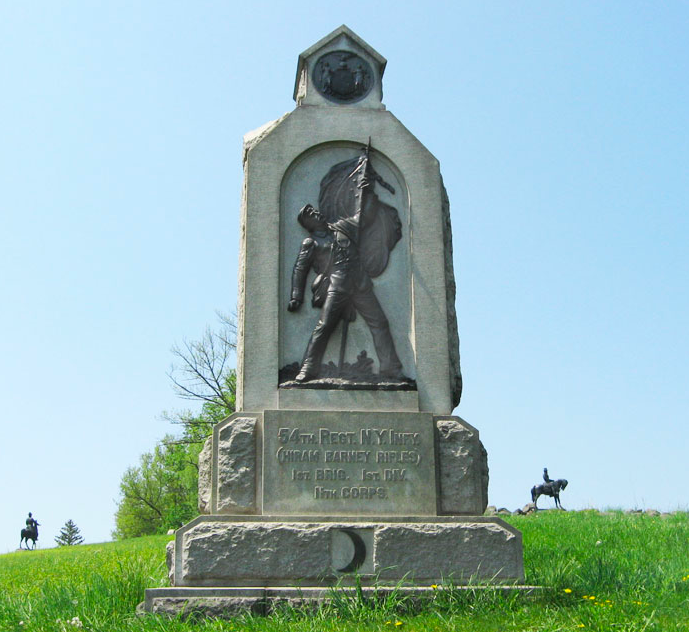Gettysburg Monuments - The 54th New York
Image credit: Gettysburg Stone Sentinels
Sometimes when studying the Gettysburg commemorative landscape, we come across multi-generational efforts. Recently, while reviewing dedication ceremonies for monuments to New York regiments, I stopped to analyze the words of one Charles G. Wahle, Jr., whose father, Charles G. Wahle, Sr. had served as captain of company I, 54th New York Infantry Regiment. At Gettysburg, the regiment saw action near Rock Creek on July 1 and 2 and lost 102 men killed, wounded, and missing. Reflecting on the momentous occasion of this particular Empire State monument dedication - on July 4, 1890 - Wahle Jr. offered a wide range of sentiments often articulated by veterans of the previous generation. Part of the speech unfolded in typical reconciliationist style. Here, we hear echoes of Lincoln (with malice toward none…) and Grant (let us have peace…):
The proffered hand we take. The blue and the gray are brothers once agin, fellow citizens of one country, ready to fight for one flag. To those who would reject the proffered hand I say,
“Deep malice makes too deep incision. Forget, forgive, conclude and be agreed.”
The South has had its lesson. It is the part of a coward to strike a man when he is down. Take the South by the hand and lead it when it is needed. Don’t try to tear open the wound which it has cost so much to close. Let us have a Union without a North, without a South, no East and no West, but an indissoluble fraternity of States.
For all the reconciliationist leanings, Jr. was sure to get in some sectional digs, reminding his audience that one side had fought to preserve the integrity of Union - the other under the banner of treason:.
Father and son in mortal combat, brother burying his sword in the brother’s heart, comrades of a lifetime, foes to death, mothers cursing the day they gave birth to rebel sons, sisters betraying brothers, homes destroyed, poverty in the land, universal distress, - that is civil war. War is terrible, war is cruel; but far worse is civil war. For years the fire had smoldered. Treason and bigotry fanned in into an all-consuming flame. “Secession” was the watchword of the Confederacy; “Union” the shibboleth of our armies. The president called for volunteers to defend the Union, and you left your homes…You left, and you knew not was it for years or was it forever; but one thing you knew and one thing you vowed, that this Union was to be preserved, Aye, if your life was to be the cost.
And though he sought forgiveness, he applauded what he deemed a just punishment while placing blame squarely on Rebel shoulders and clearly articulating the Confederate cause:
They had started the fight. Treason’s bullets had opened the war, and they were justly punished. Their homes destroyed, their plantations empty, their fields barren, the flower of their manhood dead or crippled, poverty on every side…that was the awful punishment meted out to those who defended human slavery and fought to destroy the Union.
We should always remember that Union veterans who promoted reconciliation often did so alongside an acknowledgment that theirs and only theirs was the noble cause. And it seems that this message was not lost on their children.
With compliments,
Keith
